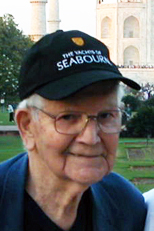 Some of you know that my delightful father, James A. “Jim” Edmonds, Jr., passed away on April 11, 2011 at 91 years of age. The photo of Dad at left is from a cruise he and my mother took in 2006; that is the Taj Mahal in the background.
Some of you know that my delightful father, James A. “Jim” Edmonds, Jr., passed away on April 11, 2011 at 91 years of age. The photo of Dad at left is from a cruise he and my mother took in 2006; that is the Taj Mahal in the background.
As executor of Dad’s estate, I am focused on the dozens of tasks and activities required to manage that process. Today, I am very much aware of how his legacy impacted my life and guided my vision, my values, my leadership point of view, and my interactions with others.
Dad was a leader throughout his career. He was founder and president of his mortgage firm for three decades. He served terms as president of the California Mortgage Bankers Association and of ARELLO, the Association of Real Estate License Law Officials. He served as commissioner of the California Department of Real Estate for eight years under governor George Deukmejian.
I learned from his staff and from my own observations that Dad was a firm yet kind and trusting leader. He was a heart-driven leader who expected a lot from his team. They delivered consistently and felt his trust and respect daily.
Let’s look at how Dad created such a positive legacy.
Three Keys to a Positive Leadership Legacy
First, be clear about what you expect from others. Set the vision and strategy, and communicate how goals & projects serve that vision and strategy.
Do not “assume” people know what you or their customers need. Define expectations in specific, measurable terms, and link expectations to the strategy of your organization. Set high standards and then allow talented people to apply their skills and hearts towards common goals.
Second, be consistent. If you promise something to a team member or a customer on a certain day at a certain time, deliver, with no excuses. Hold staff accountable for their commitments. Praise progress and goal accomplishment, and redirect when performance falls short of standard.
If team members don’t have the skills, teach them (or arrange for such teaching). Learning was a good thing in Dad’s world! If team members do have the skills but do not meet commitments, do not tolerate “missed promises.” An effective team works cohesively, all pulling towards agreed-to goals.
Finally, be nice. Be ladies and gentlemen. Even in the hectic pace of your work environment, take time to express thanks, praise effort, and offer a smile.
Dad may have disagreed with your ideas but he did not have to drag you down for him to be “OK.” Dad may have thought you were behaving badly, but he didn’t point it out (he typically removed himself from those interactions quickly).
What is your Leadership Legacy?
You may not realize it, but you are creating your leadership legacy today. You do with every plan, decision, action, and interaction. If you’re not certain that your leadership legacy is as positive as you’d like it to be, ask your team members what they think. You may find you have some work to do. That’s good – map out a path and build a legacy you’ll be proud of.



Dearest Chris
This post is stunning, heartfelt and very meaningful.
I see how your dad has had an influence in your personal and leadership development. Your dad would be very proud of the man you are today.
Lolly
Thank you, heart & soul, Lolly. He was a fine man and I’m proud to be his son.
Cheers!
C.